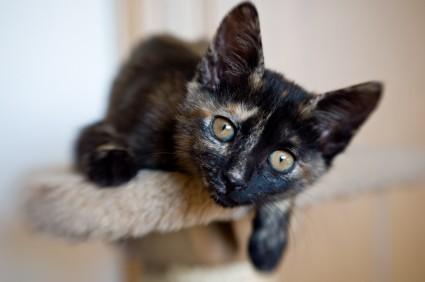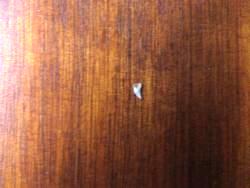Dental Care for Cats

People don't often think about the need for dental care for their cats, but cats need dental care just like we humans do.
Like humans, cats also start out with baby teeth before developing their permanent teeth.
Here is a picture of a deciduous (baby) tooth that came from one of my cats when
she was a kitten. I found it stuck in one of her toys:

Needless to say the tooth fairy was delighted at finding a such a beautiful tooth!
Kittens develop their baby teeth (also known as deciduous teeth) when they are between two to four weeks old. Once all of the deciduous teeth are in (at about 6 weeks of age) kittens have 26 of them. Like humans, kittens lose their deciduous teeth to make room for their permanent teeth. Kittens start losing their baby teeth when they are about 3 months old. An adult cat has 30 permanent teeth and these should all be in by the time the cat is 6 months old.
Do Cats Need Oral Care Once They Have Their Permanent Teeth?
You really don't need to do anything to your cat's teeth before the permanent teeth are in. However, once your cat has developed permanent teeth they will develop plaque build up and tartar just like yours would if you never brushed them.
Also, it may be easier to start your cat on a tooth brushing regimen when it is young and so you may not want to wait until its permanent teeth are in.
You can obtain special toothpaste for cats from your veterinarian or from a pet store. Don't use toothpaste that is designed for people - it will make your cat sick.
Unfortunately, not all cats like to have their teeth brushed. Usually, you don't actually use a brush. Typically, you put some of the cat toothpaste on your finger and rub the toothpaste on your cat's teeth. Some cats will tolerate this and some won't.
However, if you don't brush your cat's teeth, then once your cat is older, you will most likely have to take your cat into the vet to have your cat's teeth professionally cleaned. During this procedure your cat will be under general anesthesia and your veterinarian will clean your cat's teeth, and depending on the condition of your cat's teeth, sometimes extract some of the teeth that are in really bad condition.
It is worthwhile to at least try brushing your cat's teeth to see if she will tolerate it. Her breath will be fresher, plus unhealthy teeth often lead to an unhealthy cat. This is true for cats just as it is for humans.
If your cat absolutely won't tolerate it (and some cats don't) then be prepared to take your cat into the vet for a dental cleaning at some point. Your veterinarian will be able to tell you when a dental cleaning is necessary for your cat after examining his or her mouth.
Gingivitis in Cats
Gingivitis is defined as an inflammation of the gums. Often there are no symptoms of gingivitis unless it is severe. Symptoms of gingivitis include very bad breath, drooling, bleeding gums, or difficulty eating. A cat with gingivitis will have reddened gums on examination.
There can be several causes of gingivitis in cats. The most common is usually caused by a build up of plaque and tartar around the teeth. If left untreated this can become severe, leading to a loss of gum tissue and even the bone underneath.
If your cat has gingivitis caused by dental plaque build up it can be treated by getting your cat's teeth professionally cleaned by a veterinarian as described above. Sometimes your veterinarian will also prescribe some antibiotics, such as Clindamycin for your cat. Often the veterinarian will need to extract some of the teeth that are loose.
Another, less common cause of gingivitis in cats is the feline leukemia virus. This is due to feline leukemia's effect on the cat's immune system; weakening it so that the normal bacteria in the cat's mouth can invade the gums. The gingivitis can usually be successfully treated with antibiotics. If you have a feline leukemia positive cat living in your house you should get his or her mouth examined by the veterinarian on a regular basis.
FIV can also cause dental problems. I have an FIV positive cat that has no teeth because the vet had to pull them all. Oddly enough he seems not to mind. He still eats his food just fine - even his dry cat food.
The Importance of Yearly Dental Examinations for Your Cat
Often, your cat will have gingivitis and you will not know it until you take your cat to the veterinarian for his or her annual checkup and vaccinations. I recently had a cat (a young, healthy cat of only 2 years old) who showed no symptoms, but during her checkup the veterinarian found that she had gingivitis. She was given antibiotics, a dental cleaning by the veterinarian, had 2 teeth extracted, and she is fine now.
So, gingivitis can occur in young cats too. This is why it is important to take your cat to the vet for his or her annual checkup. Often during routine examinations, your veterinarian can find minor health problems and treat them before they become severe.
